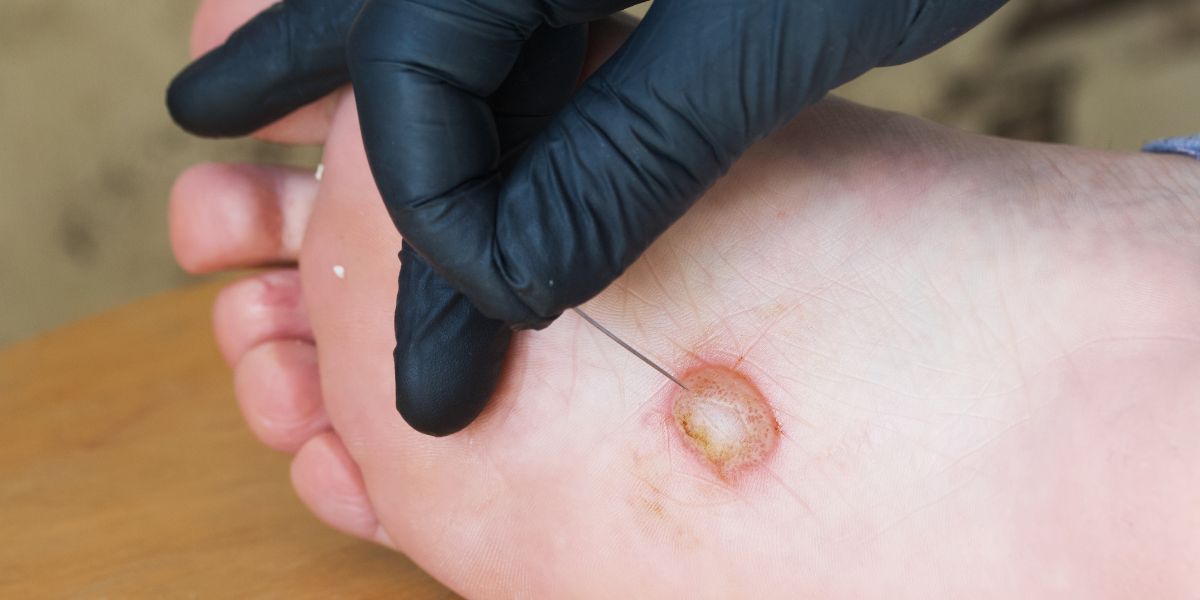Diabetes is a chronic condition that can lead to many complications. It is the cause of concern for more than one quarter of American senior citizens. A staggering 10% to 15% diabetics have leg and foot ulcers. If they are not treated, the wounds can get so bad that diabetic foot amputations may be necessary. The majority of Amputations are caused by foot ulcers. This highlights the importance of taking preventive measures and consistent care.
Diabetes management is a complex challenge that requires a holistic approach, which goes beyond glucose control. This is why daily foot care is a crucial factor in preventing the risk of diabetes-related complications.

Understanding the Landscape
The diabetes world and the complications it brings is a complicated one. The high incidence of leg and foot ulcers in diabetics highlights the need for increased awareness and proactive treatment. With the shocking data, it is clear that the best method to stop amputations from happening is to increase awareness.
The Amputation Conundrum
Amputation is a specter that creates a shadow of amputation over those grappling with diabetes. It’s a fact that goes beyond mere statistics, affecting individuals on a very personal scale. The road from a minor foot ulcer to the prospect of diabetic foot amputation is very difficult, highlighting the urgent need for preventive measures.
Daily Foot Care: A Shield From Amputation
The foundation of diabetes amputation prevention lies in daily foot care. The daily routine isn’t only about hygiene, but it also identifies and addresses potential problems before they turn into dangerous. From checking feet for injuries to ensuring proper moisturization, each step of this routine is an effective strategy in the fight against diabetic-related amputations.
Vascular Specialists: What is Their Essential Role
While vascular specialists aren’t able to directly treat diabetes, their expertise plays an important role in minimizing the issues related to the disease. In order to alleviate pain in the legs, and to speed up healing of wounds, establishing optimum blood flow is a key component of treatment. This collaboration approach has one main goal: to reduce the risk of amputations due to diabetes.
Amputation Prevention Strategies
A mix of vigilance alertness and expert guidance is necessary to navigate the complex world of amputations related to diabetes. A proactive approach is crucial for people suffering from diabetes. Regular checks with health professionals such as vascular specialists can assist in detecting early signs of diabetes and then intervene.
Leg Ulcers Learning about the Triggers
The development of leg ulcers could be a sign of more severe problems. Therefore, they require our focus. Being aware of the triggers leading to the development of leg ulcers is a crucial step. If the reason is due to an insufficient circulation or neuropathy or perhaps a combination of these causes, identifying their sources allows to make targeted treatments.
Education as empowerment
Empowering individuals with diabetes with awareness of the risks and prevention measures is crucial. In the healthcare environment and within the community as a whole, educational programs can bridge the gap between awareness to actions. Being aware of the potential consequences of seemingly unimportant wounds may prompt early responses that could prevent diabetic foot amputation.
Private Battles as well as Collective Triumphs
It’s not merely an individual fight, but rather a winning group effort to combat diabetic-related amputations. Joining support groups through your healthcare provider or in your local community can be a great method to share your experience to gain knowledge and develop coping techniques. If you are faced with the possibility of an amputation, the emotional impact can be overwhelming. Communities support networks offer support and peace.
Conclusion: The battle against diabetes, ulcers and the danger of amputations are multi-faceted. Regular foot care is the primary step to protect yourself. Vascular experts’ expertise can be a valuable advantage to avoid complications. Diabetes sufferers who are cognizant, adopt preventive measures, as well as foster a collective system of support, can navigate the complex landscape with optimism and perseverance decreasing the risk of having to be amputation.